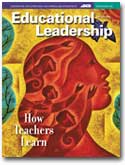Principals have found that the following approaches support strong learning communities:
Emphasize to teachers that you know they can succeed—together. Particularly in schools with a history of low achievement where many interventions have been introduced to "fix" teachers, lay the groundwork for professional learning communities by telling teachers you believe they have the expertise to make student learning happen. Make clear you expect them to pool that expertise.
One principal, hired to turn around a low-achieving high school whose discouraged staff had come to accept the "low-achieving" label, told teachers, "This year the conversation will be about learning for students and learning for adults." This principal identified one nonnegotiable expectation: Teachers in the school had to pull together and could no longer work in isolation.
Expect teachers to keep knowledge fresh. Let teachers know you expect them to keep their skills up-to-date through collaborative study. Professionals subscribe to a codified body of knowledge and commit to monitoring the latest information and skills to increase their effectiveness. We expect people in the medical and legal fields to continually review current research and exemplary practices. We should expect the same of educators.
Guide communities toward self-governance. Effective learning communities are democratic and participatory. Although you may take the lead in arranging meetings at first, over time, urge community members to assume prominent roles. Share authority and decision making from the beginning and gradually prepare other members to take the lead. Self-governance will both help a professional learning community continue and boost teachers' feelings of professionalism.
Make data accessible. One element of an effective learning community is adroitness in using data for instructional decision making. Ensure that an array of data on student performance is available in a format that teachers find understandable and that invites interpretation. You may need to help staff members acquire skills needed to interpret data, perhaps bringing in a seasoned professional to guide them.
Teach discussion and decision-making skills. Especially if collaboration is new in your school, help teachers develop skills in talking and making decisions together. Explain the different modes of dialogue and discussion. Dialogue—in which members share their knowledge, feelings, or biases—is preferable when the goal of conversation is to help participants understand one another. Such sharing often exposes the unacknowledged "elephant in the room" that can interfere with learning. Discussion is a good choice when the goal is to make a decision about a course of action. In this case, members clearly set out and support their points of view in hopes of persuading the group to adopt a particular action. Learning communities should know different strategies for finalizing decisions, including voting and consensus building.
Show teachers the research. Research on professional learning communities indicates that teachers reap such benefits as collective responsibility for student success, increased understanding of teachers' roles in helping students achieve, feedback and assistance from peers, and professional renewal. Research shows that learning in a social context is deeper than independent learning.
Take time to build trust. These activities will be effective only if mutual trust exists between the faculty and the principal as well as among teachers. Teachers will never openly express themselves if they fear their colleagues. Giving teachers guided practice in conducting appropriate conversations, making decisions, and managing conflict will help strengthen trust; so will keeping the focus on building student and teacher learning.

